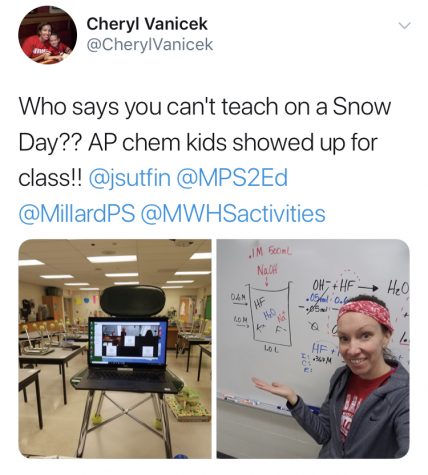E-Learning: An Advantageous Alternative
Online schooling is more beneficial for students than making up days at the end of the year
E-Learning has caused some debate on how Millard should handle snow days.
March 26, 2019
The startling blare of alarms mixed with phones vibrating on nightstands awakened many teenagers in the early morning. In a few seconds, all the noises ended only to reveal a recent notification. A faint smile developed on their faces as they turned off other alarms set to ring later in the morning. The warmth of soft sheets covered their bodies as they drifted off to sleep.
These teenagers could relax through the next day: school had been cancelled.
“Storm totals have increased and it looks like we will be impacted for the drive,” Millard Public Schools Superintendent Jim Sutfin tweeted at 4:22 in the morning. “This will be an E-Learning Day so please check Google Classroom. @MillardPS is closed March 7 due to current snow and predicted totals.”
E-Learning is a system used on unforeseen breaks where classrooms send out assignments through online websites like Google Classroom and Classkick for students to complete. This allows school districts to keep on pace with their original schedule and not add days to the end of the year, which is why Sutfin decided it was advantageous for Millard to adopt this system.
Millard has been faced with six snow days this year, an unusually high amount for the district, inching it closer to extending the school year beyond May 31st.The current 2018-2019 allowed for four snow days built into the calendar, that can be used when school needs to be called off due to inclement weather. This has been a challenge for Sutfin to call necessary snow days, but not make the year extend into June.
To solve the problem, Sutfin, Millard West principal Greg Tiemann and other administrators journeyed to Naperville, Illinois, to observe how schools there handled their snow days. Instead of adding days at the end of the year that lead into summer, the district uses E-Learning in order for students to review or get caught up with materials from class. This allows Naperville to stick to a concrete schedule excluding unforeseen interruptions. After visiting the Land of Lincoln, Sutfin decided to utilize E-Learning during further potential snow days for the year.
Although the majority of Sutfin’s Twitter feed during March 7th featured students of all grades completing their assignments and complimenting the idea, many took issue with the new snow-day system.
Students were dismayed at the concept of completing assignments over a snow day, wanting to take a relaxing break from the often stressful school week. They did not want to have another day of school with tons of assignments on what is supposed to be a tranquil few hours. However, Millard is not planning to use E-Learning as a substitute for an entire school day.
“As seamless as it can be, we want students to look forward to snow days,” Tiemann said. “We’re not going to look at having the equivalent of eight hours worth of work to do on those days and I think some students are fearing that. Just something you can do productively that day so the teacher doesn’t have to spend a half an hour reviewing content.”
There may be one to two hours of assignments depending on the class, but that is a scant workload compared to the eight hours spent inside school to make up snow days. Though homework would have to be completed on students’ break, it is a light ask of the district and allows summer to arrive earlier. School days are around seven to eight hours, so students would be making up 14 to 16 hours if E-Learning was not utilized, compared to the four to six hours it would take to do homework over all snow days combined. If these students truly care about having as little work as possible, then they would embrace E-Learning with loving arms to minimize the hours spent doing schoolwork.
Parents who supported the E-Learning system also took issue with how it was presented, mainly with teachers sending simple assignments over Google Classroom that didn’t feel engaging for their children. However, it is in its infancy in Millard. There will be modifications to how the system is set up in regards to teachers distributing assignments and what faculty will need to focus on for snow day work, whether it be review or a video lecture over a new concept. Teachers will also have time to figure out creative ways to present E-Learning assignments. In fact, some teachers found ways to go beyond the standard Google Classroom homework that was sent out. Science teacher Cheryl Vanicek used Skype to teach her lesson live to students that dropped in so they could continue their time sensitive AP Chemistry class.

A tweet of Vanicek teaching her AP Chemistry class utilizing Skype.
It may take a few tries for them to figure out the most effective teaching method during these days, but people need to have patience for its development.
Though parents and students desire more creative ways to distribute assignments, completing on homework over websites like Google Classroom also helps prepare students for college. The number of students taking online courses is rising, so it is becoming a valuable skill to be able to complete assignments over the computer on their own. Millard schools want their students to be prepared for college starting at a young age. E-Learning helps develop the skill of independently working on assignments away from the classroom.
Power outages also complicate using technology on snow days. Students can’t utilize their laptops or phones if there is not Internet at their home, thus hindering them from completing assignments. However, Millard West has a current solution to this problem.
“There needs to be flexibility,” Tiemann said. “Our guidelines to our teachers was to allow at least five days at the start of this to get things turned in. If some students have a power outage, internet’s not working or WiFi isn’t connecting, there’ll need to be some flexibility right now to work out those details.”
The blatant benefits that students receive as a result of E-Learning days should be a large incentive for Millard to keep utilizing online schooling in future years. Summer will arrive at an earlier date and it develops necessary skills to thrive independently in college. Though it may be a rough outline at this time, the district and teachers alike will work hard in order to ensure this system will become the most beneficial it can be to students.








